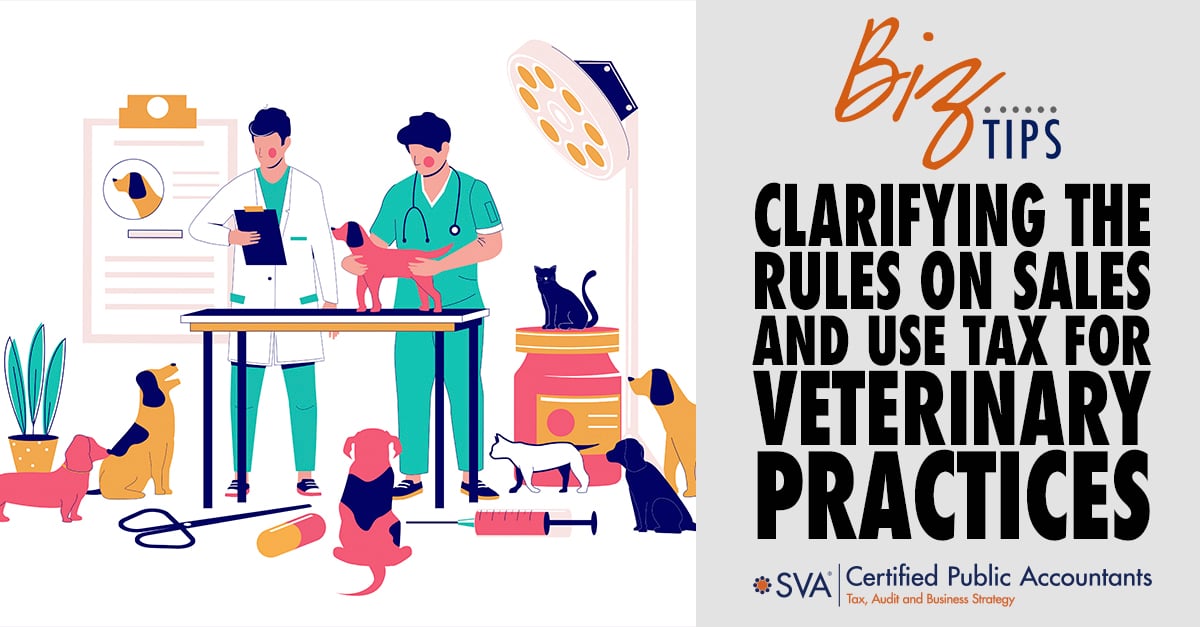| Highlights: |
- Explains the distinction between sales tax (collected on retail sales) and use tax (owed when sales tax wasn’t paid at purchase) for veterinary practices.
- Breaks down which products and services are taxable versus exempt, including examples of everyday vet transactions.
- Describes how sales and use tax interact, with examples such as resale items, clinic supplies, and drugs.
- Covers filing requirements, timing, penalties, and the importance of consulting a tax professional for compliance.
|
As a veterinary practice owner or business manager, do you know the difference between sales and use tax?
It is not as straightforward as you might think. Understanding what is taxable and what is not can be complicated. Some vet products and services are taxable, and some are not. Make sure you understand the difference so you don’t pay too much or too little sales tax.
Sales Tax
At a very high level, sales tax is a tax levied by the government on the retail sales of goods, products, and some services. It is usually calculated as a percentage of the purchase price and collected by the seller.
There can be multiple layers of sales tax. At the state level in Wisconsin, for example, it is a 5% tax (each state imposes its own tax rate). Then there can be an additional sales tax at the county level as well as at the municipal level.
(Download Video Transcript)
Use Tax
Use tax is a sales tax on purchases made outside one's state of residence for taxable items that will be used, stored, or consumed in one's state of residence and on which no tax was collected in the state of purchase.
The intention of use tax is to prevent you from making purchases in other states for, in part, the purpose of avoiding paying sales tax. If you purchase something and you don’t pay sales tax on it but you should have, then it’s considered use tax.
Specific items that are subject to use tax for veterinary practices are:
- Drugs
- Medical equipment (e.g., exam tables, scales, etc.)
- Medical supplies (e.g., gloves, splints, etc.)
- Office equipment
- Boarding supplies (e.g., cages, soap, etc.)
Some items exempt from use tax are drugs used on farm livestock or work stock, and products for resale, such as leashes.
Taxable Sales for Veterinarians
There are two major categories of taxable transactions for veterinarians: product sales and service sales.
Broadly speaking, any type of sales transaction is subject to tax unless there’s a specific exemption against it. That’s especially true with product sales as they tend to be taxable. Service sales can be more complex as they can be taxable or exempt depending on the circumstances.
Typically, sales of products are taxable, but they can be tax-exempt in certain situations. For example, a product sale can be exempt if that product is used in conjunction with normal services that are provided by a veterinarian or specifically if the product is considered a drug.
What is a Taxable Service Sale for a Veterinarian?
The easiest test is to ask, “Is the service only provided by a veterinarian or could it be provided by someone else?” If the answer is yes, then it tends to be a non-taxable event. Examples of tax-exempt service sales are exams, some vaccinations, x-rays, surgery, prescribing drugs, ordering lab testing, etc. By and large, most other services a veterinarian might provide tend to be taxable.
Tax-Exempt Service and Product Sales Examples
In the course of a veterinary practice’s operations, there are numerous tax exemptions for the purchase of products and services. Here are some specific service and product sales examples:
| Custom Farming Services |
This is a scenario in which a veterinarian is providing services to a farmer with their livestock or farm work stock which is used exclusively in the business of farming. There tend to be a lot of services and products specifically related to farming that are non-taxable events. |
| Retail Sales Tax-Exempt Transaction |
The reason is the veterinarian is deemed the consumer of the drugs and generally, that is where the burden of paying the tax lies. |
| Valid Exemption Certificate |
This is a piece of paper or a PDF that a customer may present stating that they are exempt from sales tax. So, just like any other business when presented with an exemption certificate, the customer would not be charged sales tax. |
| Occasional Sales Tax Exemption |
Very broadly, the reason this is so difficult to meet is the threshold for occasional sales is approximately $2000 a year. Most veterinary practices, where the clinic is serving clients regularly and is open a considerable amount of time during the year, tend to bypass this threshold very quickly. |
(Download Video Transcript)
How Sales and Use Tax Interact
The way sales and use tax interact is quite important for all businesses, especially veterinary practices. Typically, in the entire chain of custody of these different products, only one person should either be paying the sales tax or the use tax on that item. It should not be taxed at multiple levels. So if the veterinarian is paying the tax on it, generally that is not passed along to the customer.
Conversely, if the ultimate burden lies with the customer, generally the veterinarian should not be paying sales tax on that item or should be getting a credit out for that item when they file their sales and use tax return.
When is use tax due for a veterinarian? Use tax is due on anything where sales tax would be due but is not charged. So these two items tend to be mutually exclusive. Only pay use tax if the seller does not charge sales tax on a taxable purchase. In a nutshell, if you are paying use tax, then it’s because you didn’t pay sales tax.
If you’re paying sales tax, you are not to pay use tax on that item because then you would be paying tax on the same item twice. As a veterinarian, when you’re buying items for your practice, vendors (especially online) have gotten better at actually charging and assessing sales tax upfront, so there tends to be a lot less use tax actually being paid. This results in a lot less recordkeeping on the veterinarian side of the transaction.
Here are some examples of how sales and use tax items interact:
| Example 1: A Leash That is Resold to a Customer |
The dog owner who buys the leash should pay sales tax on the purchase because they are the end consumer. The vendor, who the veterinarian bought the leash from, should not be charging sales tax because that item is going to be resold by the veterinarian. Because it’s going to be resold, the veterinarian should also not be paying use tax on that item because sales tax was not charged by the vendor. Then the veterinarian should charge the dog owner sales tax, collect the sales tax, and report the taxable sale on the practice’s sales and use tax return. |
| Example 2: Cleaning Supplies for the Vet Practice |
In this case, the veterinarian is the end consumer and they’re using the products in the general practice of the clinic. The vendor then should charge the vet practice sales tax on the invoice. If the vendor does not charge the practice sales tax, the practice should report the purchase on their sales and use tax return and pay use tax on the purchase. |
| Example 3: When a Veterinarian Buys Drugs |
The veterinarian should be charged sales tax on drugs and related items because, whether they’re going to be used in the production of actual services or if they’re going to be passed along to the patient, they are deemed to be consumed at the veterinarian level. |
Some Headscratchers
For sales and use tax, there are a lot of exceptions and a lot of technicalities that make this issue even more complicated. The following are tried and true examples that may cause a veterinary practice to not necessarily report and pay these taxes correctly:
| Cremation and Euthanasia |
If the animal remains are returned to the customer, it's a taxable service. If the animal remains are disposed of by the veterinarian, it's a non-taxable service. |
| Microchipping |
If the veterinarian doesn't administer anesthesia when providing the microchipping, it's a taxable service. If the veterinarian does administer anesthesia while microchipping, it's a non-taxable service. |
| Pet Food |
Most of the time pet food is taxable unless it contains a drug. It is also non-taxable if it is specifically formulated for use in diagnosis, cure, mitigation, treatment, or prevention of disease in animals. This can be an extremely gray area as pet food could in part be used to promote health and well-being. |
| Boarding, Food, and Grooming |
If it's in conjunction with an exempt vet service, it's not taxable. For example, if these services are being provided because an animal need observation after surgery, then boarding, food, and grooming services are not taxable. However, if a veterinarian is providing these services for a customer who is going on vacation, then it's a taxable service. |
| Shampoo |
Similar to pet food, it’s a taxable product unless it’s a drug (i.e., flea shampoo is a drug designed to prevent or eliminate fleas) |
Filing Sales and Use Tax Returns
The filing of the sales and use tax return can be monthly, quarterly, or annually. It depends on prior-year sales and purchase amounts, and it can also change year over year.
For example, in the situation with practices just starting out, they may file annually. Then, as the practice grows and there’s more volume to submit to the state, depending on product and service mix, tax returns may need to be submitted more frequently. The more volume and the more tax a practice is submitting, the more frequently that practice should report and pay.
Filing timely sales and use tax returns are of extreme importance because a veterinary practice can receive a discount on sales tax between $10 and $1,000. So if you file on time, you receive a reward.
On the other hand, filing late can cost you penalties (i.e., a minimum $20, interest of 1.5% per month, and a penalty of 5% per month up to 25% max).
If you have a good history with the state of filing on time and something out of the ordinary happens and you are late, don’t be afraid to call the state and beg for forgiveness. The worst they can say is no but, at times, the state can be accommodating if you have a good timely filing history.
Most Importantly...
The most important step in managing sales and use tax is to make sure you consult with a professional to ensure that what you are reporting and paying is correct. Some items to keep in mind:
- Following what was done in the past may not be correct. Doing this may lead you to an audit at some point in the future.
- Review vendor invoices to make sure the sales tax you are charged is correct or what taxable purchases you should pay use tax on.
- Rules for sales and use tax do change, so stay on top of the ever-changing regulations.
Sales and use tax can be very complicated. Depending on where you practice and what services you provide, there can be a lot of exceptions to the rules.
It’s important to have a conversation with your CPA to make sure you are paying the right amount of sales and use tax. If you need guidance on this topic, contact SVA today.
© 2021 SVA Certified Public Accountants

